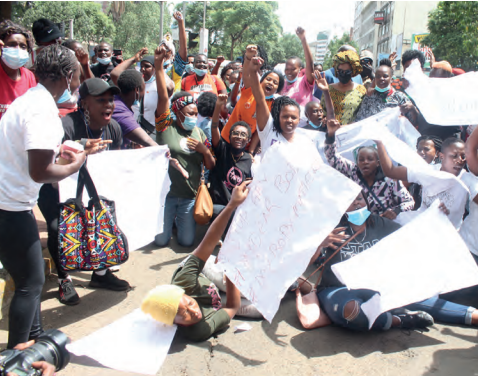
In a departure from being perceived as deeply conservative, a new research has shown the majority of Kenyans now embrace women rights and feminist activists, supporting their participation in protest.
The report says an overwhelming number of Kenyans support women agitation for equality and all spectrum of rights.
The study was commissioned by Defenders Coalition on the perception of participation of women in activism and human rights defence work.
It is titled “The gendered nature of the right to protest in Kenya: An Assessment.” Respondents appreciated the participation of women in causes that herald basic rights, including emerging areas like environmental justice, land justice and women rights.
The report comes when the world is marking the UN-backed 16 days of activism, which is an international campaign to challenge violence against women and girls.
The annual campaign runs from November 25, the International Day for the Elimination of Violence against Women, to December 10, the Human Rights Day.
It also comes as the country is grappling with the rising tide of femicide.
The latest police report shows more than 100 women have been killed by their intimate partners over the last 100 days.
“Majority of the women human rights defenders stated that their parents approved and supported their engagement in peaceful protests at 54 per cent,” the report says.
Sixty one per cent of the women human rights defenders surveyed said their families supported their engagement in peaceful protest.
Among their peers and friends, women activists enjoyed overwhelming support, with more than 71 per cent approving their engagement in peaceful protests and 61 per cent supporting their involvement.
In terms of general public support, there was a high level of community approval for women activists’ engagement in peaceful protests at 69 per cent.
“Slightly above 60 per cent of the WHRDs interviewed stated that the society in general both approved and supported their engagement in peaceful protests. Almost a third of the WHRDs were either unsure or stated unequivocally that their societies disapproved of their engagement in peaceful protests,” the report shows.
Slightly over a quarter of the women activists sampled were unsure or marked their community as disapproving of the engagement in peaceful protests. In addition, 24 per cent stated that their parents did not support their involvement, while 14 per cent were unsure whether their parents or guardians supported their engagement in protests.
The participants in the study were women of varying ages Women activists aged 31-40 years had the greatest representation in the survey at 33 per cent, followed by those in the 26-30 year group at 13.5 per cent, while those aged 41- 45 years consisted 11.7 per cent.
Those above 60 years were the
lowest percentage at four per cent,
which could imply that the likelihood to continue engaging in human
rights work reduced with age.
In terms of education, 68 per cent
of the participants had post-secondary school education with 29.2 per
cent having university level education, while 8.76 per cent only had
primary school education.
In regard to marital status, those
who were married consisted 40.15
per cent, single at 47.08 per cent, 7.3
per cent identified as divorced while
4.1 per cent were widowed.










